In the ever-evolving landscape of global trade and logistics, the transportation of oversized and exceptionally heavy cargo has become increasingly vital. At CarMax Vehicle, we specialize in providing robust semi-trailer solutions tailored to meet the unique demands of heavy lift cargo transportation. This comprehensive guide delves into the heavy lift cargo definition, exploring its intricacies, the challenges it presents, and the innovative solutions that ensure safe and efficient transport.
What Constitutes Heavy Lift Cargo?
Heavy lift cargo refers to exceptionally large, overweight, or bulky items that exceed the standard transportation thresholds. These cargos often require specialized handling, equipment, and logistical planning to ensure their safe and efficient movement from one location to another. Common examples include:
- Industrial Machinery: Large-scale manufacturing equipment, turbines, and generators.
- Construction Materials: Prefabricated structures, heavy beams, and large containers.
- Energy Sector Components: Wind turbine blades, oil rig parts, and power transformers.
- Transportation Assets: Aircraft parts, shipping containers, and railcar components.
Key Characteristics of Heavy Lift Cargo
| Characteristic | Description |
|---|---|
| Excessive Weight | Typically exceeds standard load limits, often surpassing 100 tons. |
| Oversized Dimensions | Length, width, or height may exceed regulatory limits, requiring special permits. |
| Fragility | Despite size and weight, certain heavy cargos are delicate and require careful handling. |
| Value | High-value items where precision in transportation is critical to prevent costly damages. |

Regulatory Framework Governing Heavy Lift Transportation
Transporting heavy lift cargo involves navigating a complex web of regulations to ensure compliance and safety. These regulations vary by country and region but generally cover aspects such as:
Permit Requirements
- Oversize/Overweight Permits: Necessary for cargos exceeding standard dimensions and weight limits.
- Route Surveys: Assessments to identify suitable transportation routes, considering road conditions, bridge capacities, and potential hazards.
- Escort Vehicle Mandates: In some jurisdictions, escort vehicles are required to accompany heavy transports to enhance safety.
Safety Standards
- Load Securing Protocols: Strict guidelines on how to secure cargo to prevent shifting during transit.
- Vehicle Specifications: Requirements for trailers, axles, and braking systems to handle heavy loads.
- Driver Qualifications: Specialized training and licensing for drivers handling heavy lift cargo.
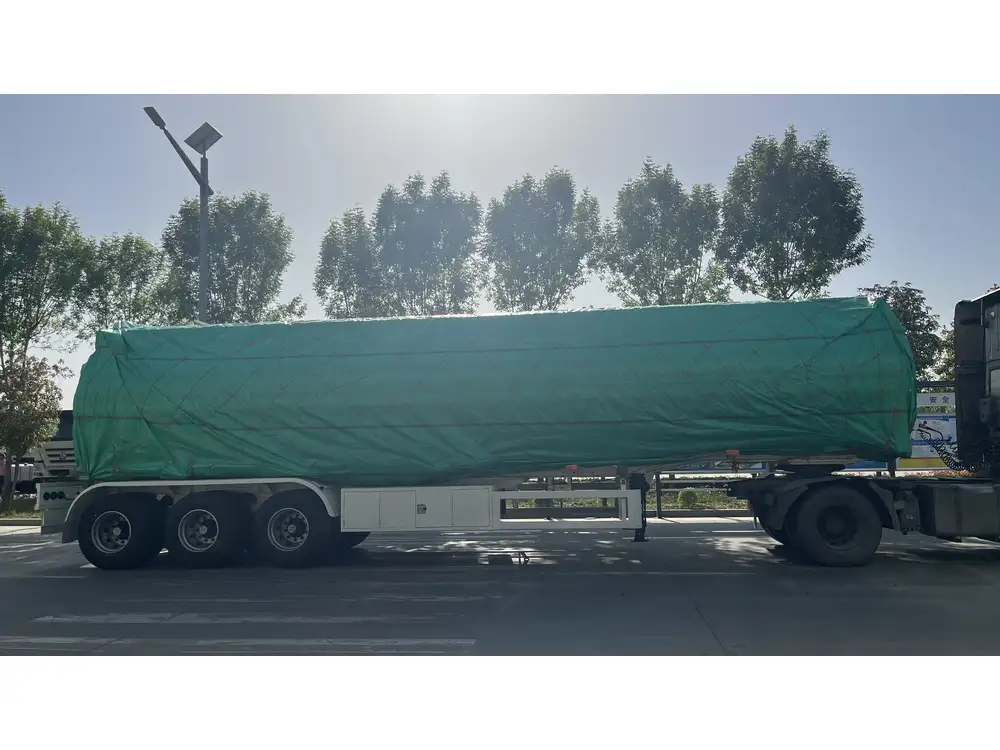
Challenges in Heavy Lift Cargo Transportation
Transporting heavy lift cargo is fraught with challenges that require meticulous planning and execution. Understanding these challenges is crucial for developing effective strategies to mitigate risks.
Logistical Complexities
- Route Planning: Determining the most efficient and safe routes that can accommodate oversized loads without causing disruptions.
- Permitting Delays: Securing necessary permits can be time-consuming, potentially causing delays in delivery schedules.
- Coordination Among Stakeholders: Effective communication between manufacturers, transporters, regulatory bodies, and recipients is essential to ensure seamless operations.
Equipment Limitations
- Specialized Trailers: Heavy lift cargos often require hydraulic modular trailers, extendable trailers, or ultra-heavy-duty semi-trailers, which are not universally available.
- Maintenance and Reliability: Ensuring that all equipment is in optimal condition to prevent breakdowns that could jeopardize the cargo and safety.
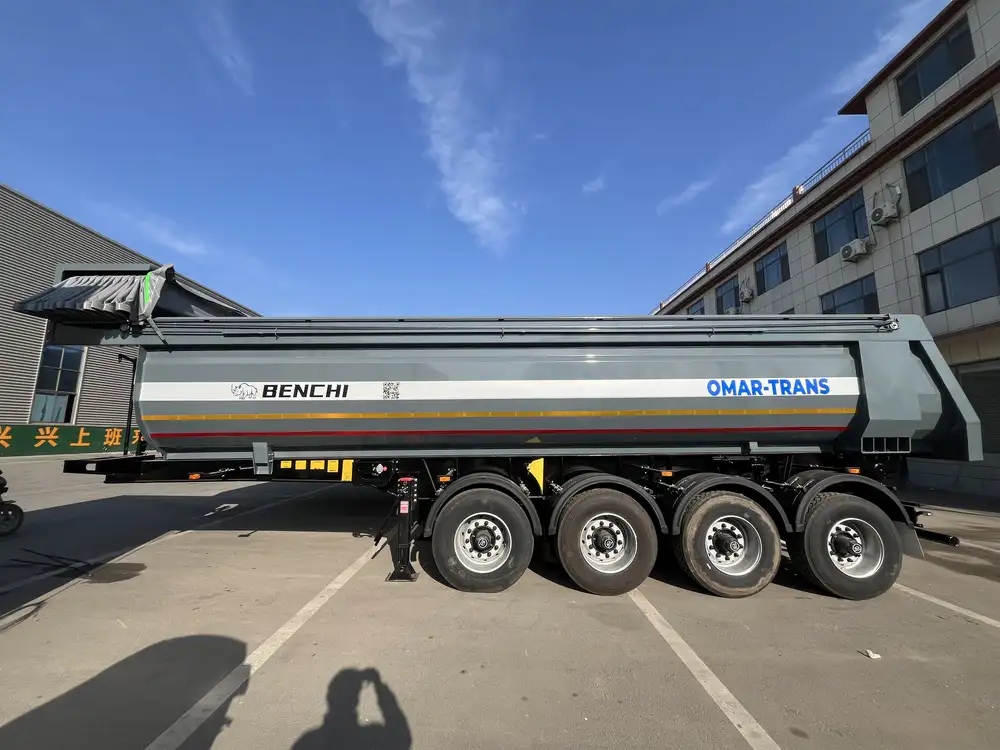
Environmental Factors
- Weather Conditions: Adverse weather such as heavy rain, snow, or high winds can significantly impact transportation schedules and safety.
- Geographical Obstacles: Natural barriers like rivers, mountains, and urban congestion areas pose additional challenges for heavy lift operations.
CarMax Vehicle’s Solutions for Heavy Lift Cargo
At CarMax Vehicle, we understand the complexities involved in heavy lift cargo transportation. Our range of semi-trailers is specifically engineered to address these challenges, ensuring that your cargo is transported safely, efficiently, and in compliance with all regulatory requirements.
Advanced Trailer Designs
Our semi-trailers are designed with the latest technology to handle the demands of heavy lift cargo. Key features include:
- Hydraulic Modular Systems: Allow for adjustable trailer lengths and heights, accommodating various cargo sizes and shapes.
- Reinforced Framework: Enhanced structural integrity to support extreme weights without compromising stability.
- Innovative Load Securing Solutions: Integrated systems for securing heavy cargos, minimizing the risk of shifting during transit.

Customization and Flexibility
We offer tailored solutions to meet the specific needs of each heavy lift project. Our customization options include:
- Adjustable Axle Configurations: Configurable axles to distribute weight evenly and comply with local regulations.
- Specialized Decking: Non-slip, reinforced decking materials to ensure secure cargo placement.
- Adaptable Tie-Down Points: Flexible tie-down systems to accommodate a wide range of load securing mechanisms.
Comprehensive Support and Services
Beyond providing top-tier semi-trailers, we offer a suite of support services to streamline your heavy lift operations:
- Route Survey Assistance: Expert guidance on planning optimal transportation routes to minimize risks and delays.
- Permit Acquisition Support: Assistance in navigating the permitting process, ensuring all necessary documentation is in place.
- Maintenance and Repairs: Prompt and reliable maintenance services to keep your trailers in peak condition.
The Importance of Proper Cargo Planning
Effective cargo planning is pivotal in ensuring the success of heavy lift transportation. It encompasses several critical aspects:

Pre-Transport Assessment
Conducting a thorough assessment of the cargo, including its weight, dimensions, and fragility, allows for the selection of appropriate transportation methods and equipment.
Risk Management
Identifying potential risks and developing contingency plans helps mitigate unforeseen challenges. This includes evaluating environmental factors, potential route disruptions, and equipment reliability.
Scheduling and Timing
Coordinating transportation schedules to align with project timelines and regulatory requirements ensures timely delivery without compromising safety.

Technological Innovations Enhancing Heavy Lift Transportation
The transportation industry is witnessing significant technological advancements that enhance the efficiency and safety of heavy lift operations. Some notable innovations include:
GPS and Real-Time Tracking
Advanced GPS systems enable real-time tracking of heavy lift cargos, providing visibility into their location and movement. This facilitates proactive management of transportation routes and timely responses to any issues that arise.
Load Monitoring Systems
Integrated load monitoring systems continuously assess the status of the cargo, detecting any shifts or instabilities. These systems alert operators to take immediate corrective actions, ensuring the safety of the cargo and the transport vehicle.
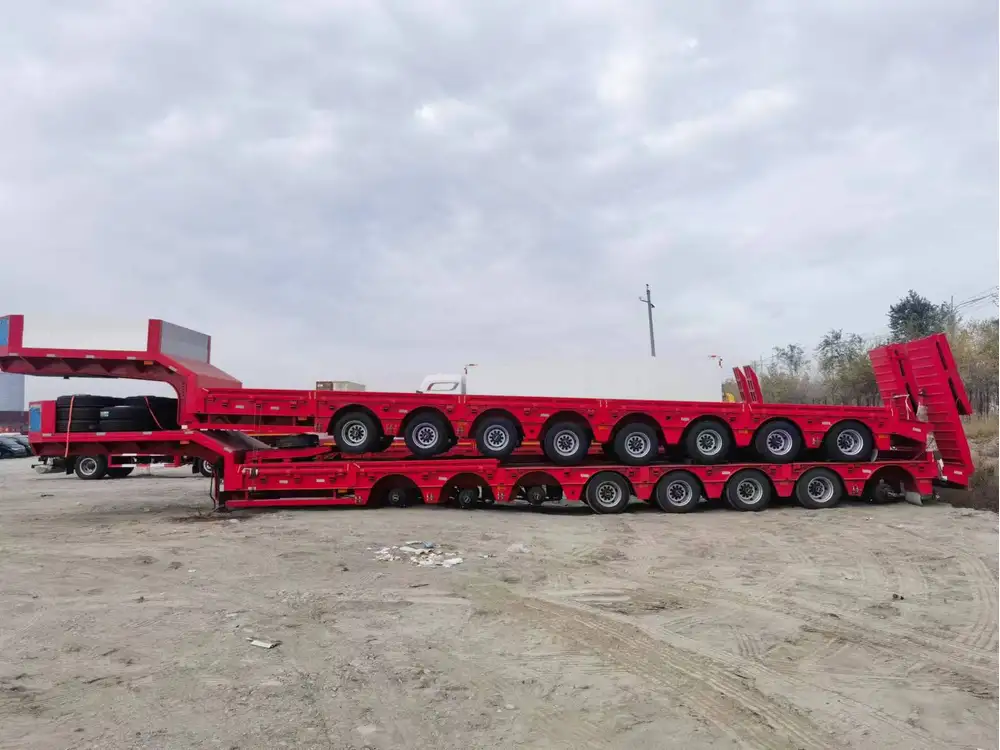
Automation and Robotics
Automation technologies are being increasingly incorporated into trailer design, enhancing precision in load handling and securing processes. Robotics can also assist in the construction and maintenance of specialized trailers, improving overall efficiency.
Sustainable Practices in Heavy Lift Transportation
Sustainability is becoming a key consideration in the transportation sector. At CarMax Vehicle, we are committed to integrating eco-friendly practices into our heavy lift solutions:
Fuel-Efficient Trailers
Our semi-trailers are engineered to optimize aerodynamics and reduce fuel consumption, minimizing the environmental impact of transportation operations.

Sustainable Materials
We prioritize the use of recyclable and sustainable materials in our trailer construction, reducing waste and promoting environmental responsibility.
Energy-Efficient Manufacturing
Our manufacturing processes are designed to minimize energy usage and reduce carbon emissions, aligning with global sustainability goals.
Case Studies: Successful Heavy Lift Projects
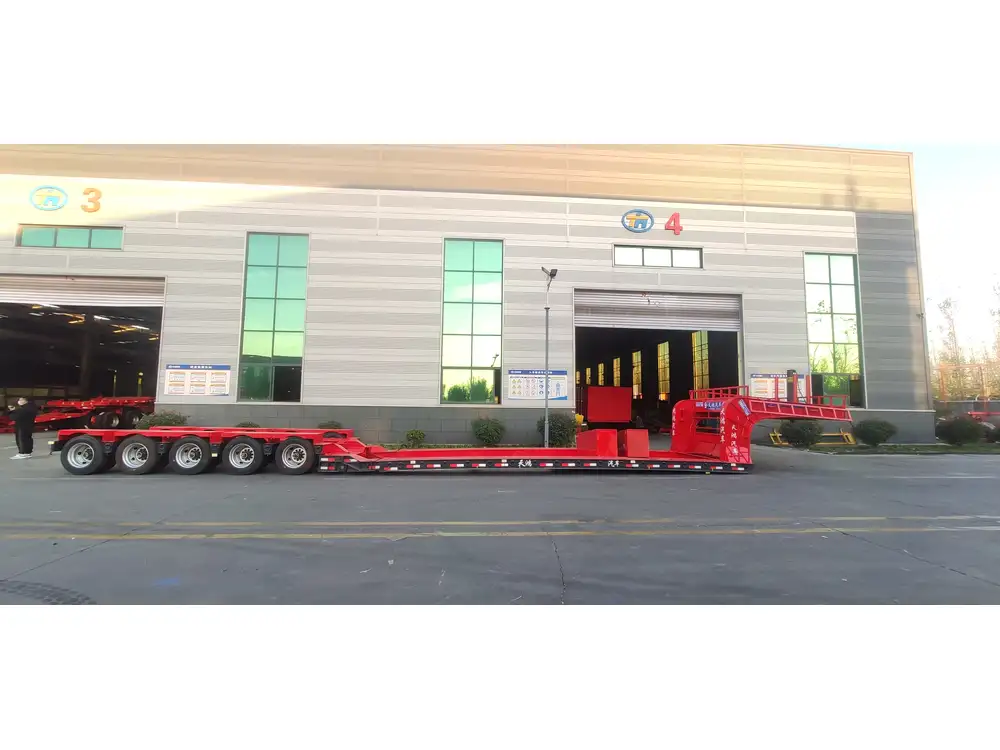
Industrial Machinery Transportation
A leading manufacturing firm required the relocation of a 150-ton industrial press from their production facility to a new location. CarMax Vehicle provided a customized hydraulic modular trailer with reinforced framing and specialized load securing systems. Our team conducted route surveys and obtained the necessary permits, ensuring a seamless transportation process. The cargo was delivered on schedule, with no incidents, showcasing our expertise in handling complex heavy lift operations.
Wind Turbine Blade Delivery
A renewable energy company needed to transport 60-meter-long wind turbine blades to multiple offshore wind farm sites. Utilizing our extendable semi-trailers, we accommodated the oversized dimensions and ensured secure handling throughout the journey. Advanced GPS tracking and real-time monitoring enabled efficient route management, completing the project with high customer satisfaction.
Best Practices for Handling Heavy Lift Cargo
To ensure the safe and efficient transportation of heavy lift cargos, adhere to the following best practices:

Comprehensive Planning
Invest time in detailed planning, encompassing route selection, equipment requirements, and regulatory compliance. Early planning helps identify potential challenges and develop strategies to address them.
Effective Communication
Maintain clear and consistent communication among all stakeholders, including manufacturers, transporters, regulatory authorities, and recipients. Transparent communication facilitates coordination and swift resolution of any issues.
Rigorous Training
Ensure that all personnel involved in heavy lift operations are adequately trained and certified. Specialized training programs enhance proficiency in handling, securing, and transporting heavy cargos safely.
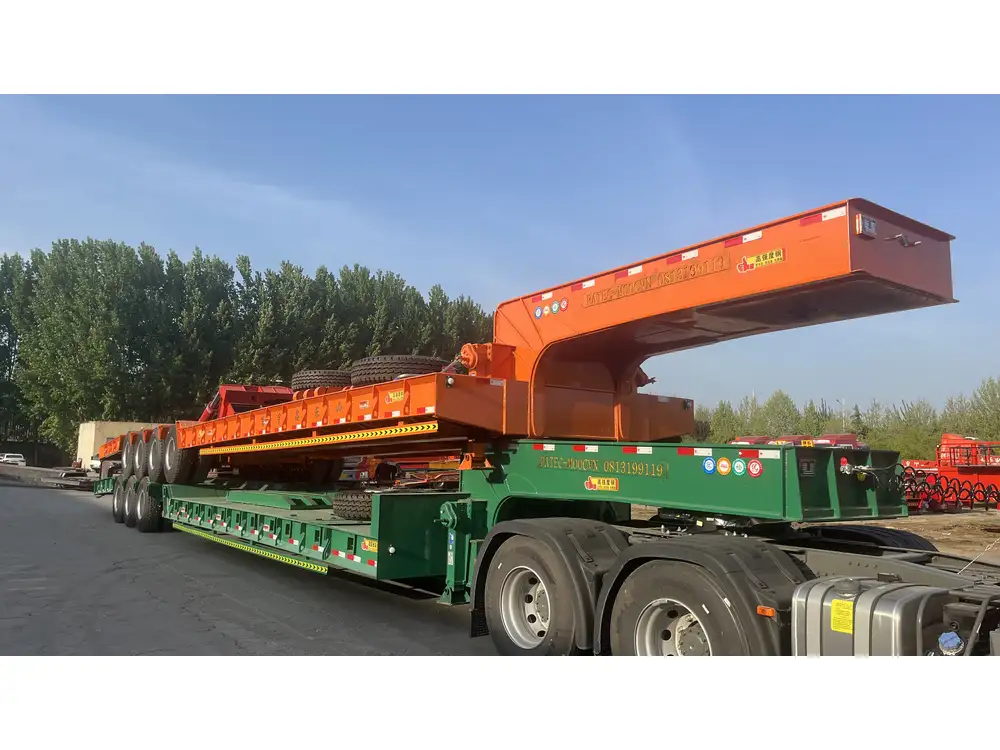
Regular Equipment Maintenance
Conduct routine inspections and maintenance of all transportation equipment to prevent mechanical failures and ensure reliability during transit.
The Role of CarMax Vehicle in Heavy Lift Transportation
At CarMax Vehicle, we are dedicated to delivering exceptional heavy lift transportation solutions. Our commitment to quality, innovation, and customer satisfaction sets us apart in the industry. By partnering with us, you gain access to:
- Expertise: Years of experience in designing and manufacturing specialized semi-trailers for heavy lift applications.
- Customization: Flexible solutions tailored to meet the specific needs of your heavy lift projects.
- Reliability: Robust and dependable equipment that ensures the safe and timely delivery of your cargos.
- Support: Comprehensive services that cover every aspect of the transportation process, from planning to execution.
Future Trends in Heavy Lift Cargo Transportation
The heavy lift transportation sector is poised for significant advancements driven by technological innovations and evolving market demands. Key trends to watch include:
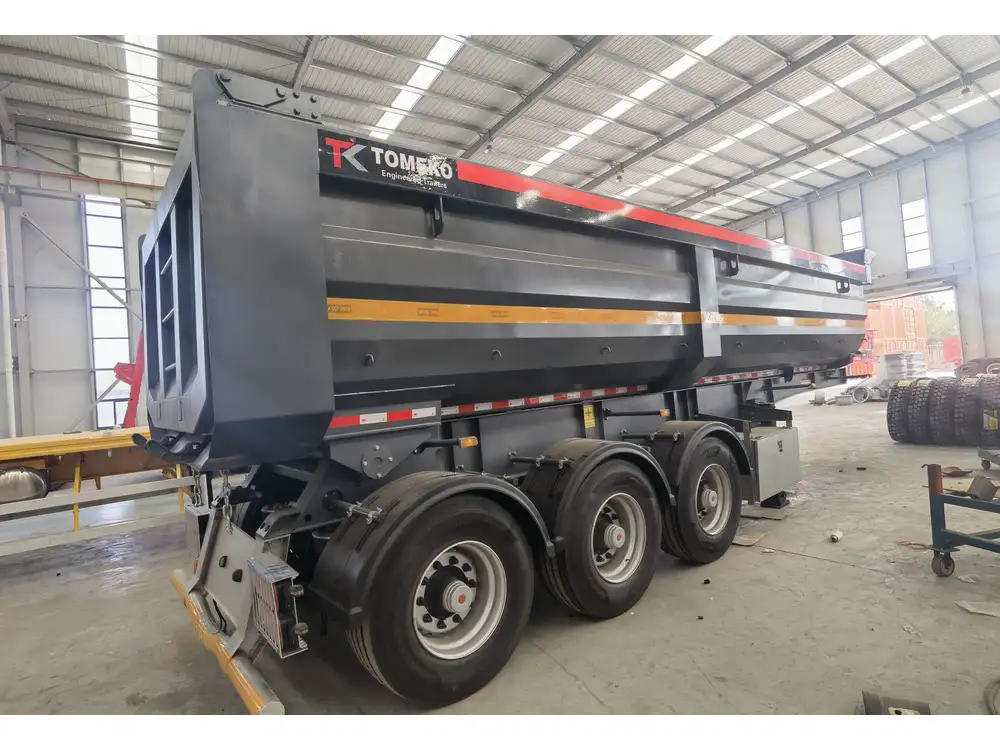
Electrification of Transportation
The shift towards electric vehicles extends to heavy lift transportation, with the development of electric semi-trailers offering reduced emissions and lower operating costs.
Autonomous Transport Systems
The integration of autonomous technologies promises to revolutionize heavy lift logistics, enhancing efficiency and safety through automated route planning and real-time monitoring.
Enhanced Data Analytics
Leveraging big data and analytics enables more informed decision-making, optimizing transportation routes, predicting maintenance needs, and improving overall operational efficiency.

Collaborative Logistics Platforms
Digital platforms facilitating collaboration among stakeholders streamline communication, coordination, and resource sharing, fostering more efficient heavy lift operations.
Conclusion
Heavy lift cargo transportation is a critical component of global trade, necessitating specialized solutions to address its inherent challenges. At CarMax Vehicle, we are at the forefront of providing innovative semi-trailer solutions that ensure the safe, efficient, and compliant transport of oversized and overweight cargos. By leveraging our expertise, advanced technology, and commitment to sustainability, we empower businesses to navigate the complexities of heavy lift logistics with confidence and precision.
Frequently Asked Questions
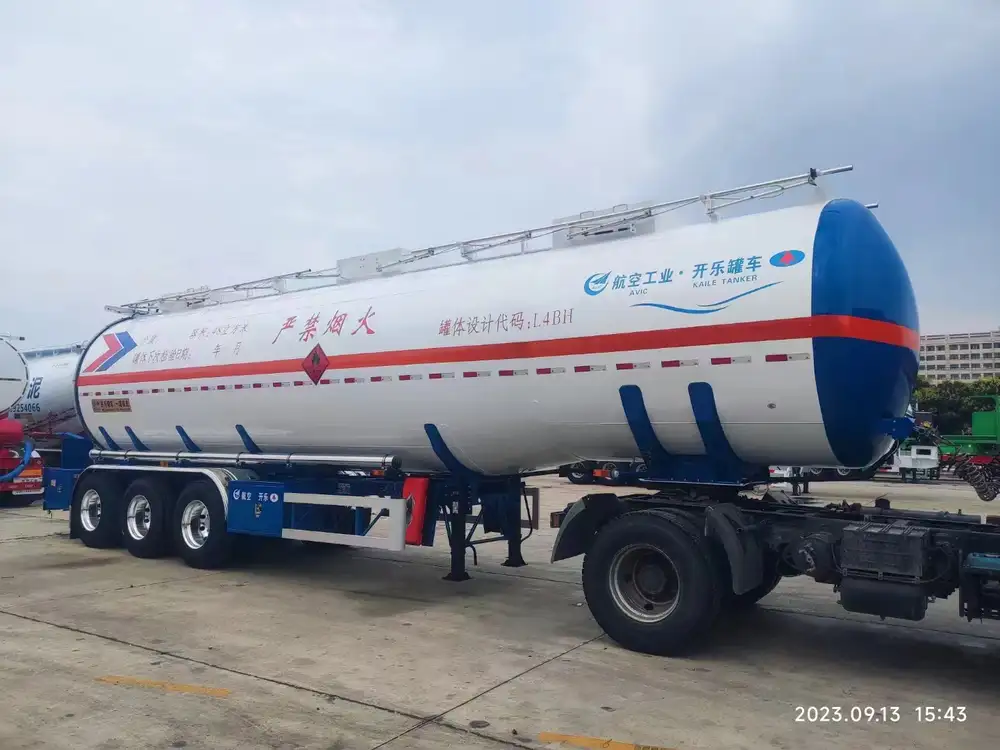
1. What defines heavy lift cargo in terms of weight and size?
Heavy lift cargo typically refers to items that exceed standard transportation weight limits, often surpassing 100 tons, and possess oversized dimensions that may require special permits and equipment for transport.
2. What types of semi-trailers are best suited for heavy lift cargo?
Specialized semi-trailers such as hydraulic modular trailers, extendable trailers, and ultra-heavy-duty flatbeds are ideal for heavy lift cargo, offering the necessary strength, adjustability, and load securing features.
3. How can I ensure compliance with transportation regulations for heavy lift cargo?
Working with experienced manufacturers like CarMax Vehicle can help navigate the complex regulatory landscape. We provide support in route surveys, permit acquisition, and ensure that our trailers meet all safety and compliance standards.

4. What are the key considerations when planning a heavy lift transportation project?
Critical considerations include comprehensive route planning, securing necessary permits, selecting appropriate equipment, conducting risk assessments, and ensuring effective communication among all stakeholders involved in the project.
5. How does CarMax Vehicle support sustainable heavy lift transportation?
We design fuel-efficient trailers, use sustainable materials in our manufacturing processes, and implement energy-efficient practices to minimize the environmental impact of heavy lift transportation operations.



